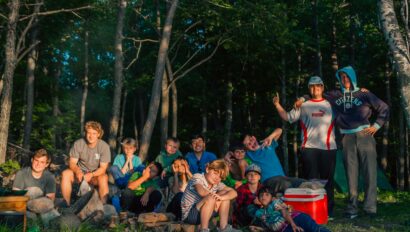Aesop’s Fables are something we are all familiar with. One in particular, is the story of the City Mouse and the Country Mouse. We all feel comfortable in our home-town environment. Take us out of our familiar surroundings and we may feel a sense of discomfort, unease and disorientation. Whether you live in a more rural area and go to the big city, or the other way around, you’ll feel a little out of sorts compared to what you’re used to.
 Camp Chippewa for Boys is located in the heart of the Chippewa National Forest. Established in 1902 as the Minnesota Forest Reserve, re-established the Minnesota National forest in 1908, and then renamed the Chippewa National Forest in 1928, as it is now known, (only seven years before Camp Chippewa was established), the Forest has more lakes and wetlands than any other National Forest in the nation. Covering nearly 670,000 acres, it boasts of having 1,300 lakes and almost 1,000 miles of rivers and streams. It also is home to more than 150 nesting pairs of bald eagles—the highest density of bald eagles in the lower 48.
Camp Chippewa for Boys is located in the heart of the Chippewa National Forest. Established in 1902 as the Minnesota Forest Reserve, re-established the Minnesota National forest in 1908, and then renamed the Chippewa National Forest in 1928, as it is now known, (only seven years before Camp Chippewa was established), the Forest has more lakes and wetlands than any other National Forest in the nation. Covering nearly 670,000 acres, it boasts of having 1,300 lakes and almost 1,000 miles of rivers and streams. It also is home to more than 150 nesting pairs of bald eagles—the highest density of bald eagles in the lower 48.
Camp Chippewa calls this forest home. Nestled in a pristine environment, our outdoor wilderness comes with fresh air and water, beautiful vistas, majestic trees, and with all this nature, come some pests.
“Good Minnesotans” value self-deprecating humor. We politely giggle when people talk about our state bird being the mosquito instead of the loon. We chuckle when we don’t put our winter coats or shovels away until May. And we say we love hard-water fishing—drill a hole in the ice and hope you get a bite.
We’ve endured a long winter. Complete with Polar Vortex cold, record amounts of snow, and potholes in the road that will swallow a small car. And now, it’s bug season. What do we do?
I’ve lived in the Midwest for over a half century and have yet to contract any bug borne illnesses. Well, we’re considered pretty smart folks in Minnesota, therefore, we use some common sense, modern products, and wear appropriate clothing.
You don’t have to reinvent the wheel—we’re happy to share all the tips we know about Minnesota’s pests. First, nothing I know of will kill you. But we do have bugs that can cause problems if left untreated. Top of the list seems to be the mosquito.
The number of mosquitoes that are actually capable of causing infection in humans is relatively small, but it is always advisable to take preventive measures to protect yourself. At camp, mosquitoes are mostly nocturnal. Meaning they are out early in the morning and come out around sunset. At camp, we teach our staff and campers to wear light weight pants and long sleeve shirts in the morning and evening.
The best repellent I’ve ever used is a 3M product called Ultrathon. The active ingredient is DEET which is time-released so it lasts longer. 100% DEET products are nasty. They work for about 10 minutes, can dissolve many plastic products, and make your hands sticky. I still have a small tube of Ultrathon from 2010 and it still works great if I need it. Just use a chocolate chip’s worth and rub that on to your ears, neck, and back of hands. Boom—bugs will pretty much leave you alone.
Camp Chippewa calls this forest home. Nestled in a pristine environment, our outdoor wilderness comes with fresh air and water, beautiful vistas, majestic trees…
Tick numbers are highest May and early June. They die off quickly and become a memory. Ticks are typically found waiting for a passerby on tall grass along paths or in the woods. The best preventative method is to have on a pair of long, light weight pants. If you feel a tick crawling on you pick it off, squeeze and toss. If the head is already in your skin, our medical staff will properly remove it. Camp Chippewa does not have a lot of tall grass and very few deer ticks during camp. Lyme disease is found in the Chippewa National Forest. Lyme disease is easily recognizable and treated with antibiotics.
Horse flies and deer flies are pesky buggers and seem to come around when warm dry weather hits camp. A hat is the best protection. These beasts are generally not found in camp, but out on the trail they are nasty for sure. So are the quick little ankle biters found while paddling a canoe or sail boat. They just hurt when they bite. The solution? Yep, you guessed it, long pants and socks.
Oh, that reminds me. We are a sock wearing camp. Seems like an anti-summer kind of thing, but all in all it really helps with foot health and our medical staff appreciates that.
Snakes—got ‘em. We have two around camp. The common garter snake and the red belly swamp snake. Both nonpoisonous and a wonderful benefit to the overall habitat.
What scares me the most? Chelydra serpentine, aka, the common snapping turtle. Oh, they leave you completely alone, but when they come-on shore to lay eggs? Yikes, they look scary and prehistoric. The old saying of look but don’t touch is required here.
So, what’s our biggest problem with insects? When boys don’t have the self-control to keep from scratching mosquito bites. Our standard operating procedure (SOP) is to not get them in the first place, to rub them only when necessary, and get anti-itch lotion from the medical staff. If bites are scratched to the point of bleeding, infection can occur and that can be no fun at all.
No scorpions, no poisonous snakes, no Zika virus, no blood sucking vampires (that I know of.) Camp is out in the wilderness. There are many species of birds and mammals. Boys will catch many kinds of game fish. The occasional salamander will be found. Bees are around only to collect nectar and pollen. Wasps, hornets and yellow jackets may be present, but once a nest is discovered it is eliminated.
And finally, a word about Toxicodendron radicans, poison ivy. It is a hardy plant and we continue to eradicate it around camp. Best prevention is by identification. If you do come in contact, simply wash with soap and water. It can cause an irritating, itchy rash. P.I. can be quickly and easily treated and will go away in a few days. 
Camp is a great place to be a kid—bugs and all. Dress right, use a dab of Ultrathon (a little goes a long way), and don’t go looking for trouble. Our medical staff will take care of all the pesky issues. What doesn’t kill you only makes you stronger…if that’s true, your son will be in good hands.



